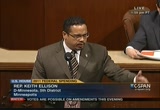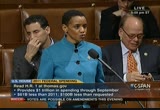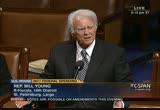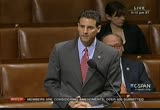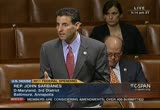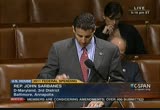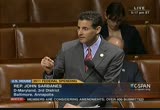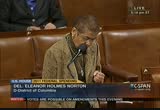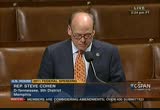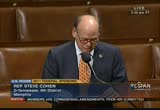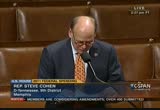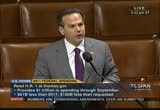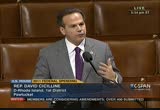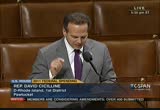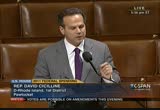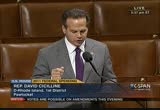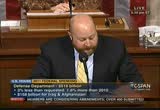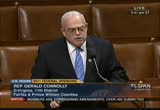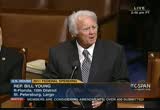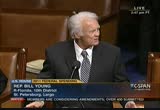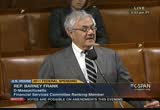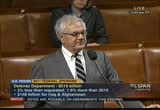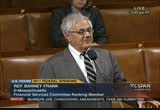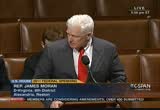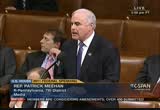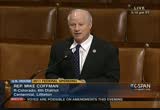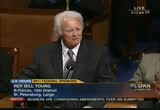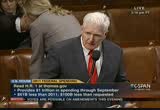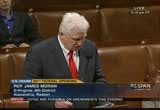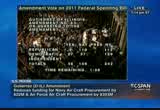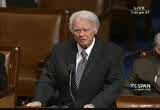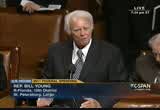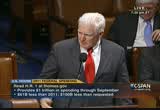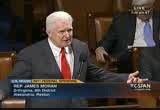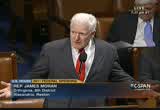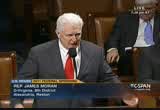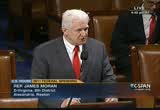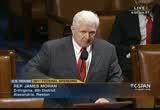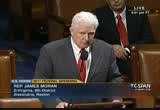tv U.S. House of Representatives CSPAN February 15, 2011 5:00pm-8:00pm EST
5:00 pm
massive tax cuts to the rich, two wars, and big phrma giveaways. they created the problem, now when we try to solve it, they want to put us back in the hole. so, madam speaker, i want to say that if this country, our country has a deficit to fix, let's fix it by a bold, creative, courageous vision of america where we create infrastructure, we create work, we create jobs rather than just cutting back the social safety net and taking away what little people have. . we need to stop the republicans' no job agenda. i yield back. the chair: the gentleman from minnesota yields back. for what purpose does the gentlelady from texas rise? the gentlelady from texas is recognized for five minutes. ms. jackson lee: thank you, madam speaker. sometimes this is a complex
5:01 pm
debate, we hear words like c.r., a lot about voters and others who are paying attention to the work that they sent us here to do. and a lot of times they try to ensure that we use vernacular that, what does it mean? we're in the budget year of 2012 or budget year 2011 or we're doing a c.r.? i think the plain and simple of it is we're trying to ensure that what you are getting now, if you're on a job, if you're a police officer, that we don't turn the lights out on you. and my concern is to let you know that we have been steadily improving. the private sector has been creating jobs under the democratic policies, under president obama's guidance and frankly under this new budget that we'll debate, that's not what we're debating today, that speaks about competitiveness and
5:02 pm
speaks about infrastructure rebuilds, putting americans to work. so my gripe with the c.r. that my friends on the other side of the aisle have now put forward is that they originally came up with a $60 billion to $74 billion, maybe a thoughtful analysis of what we could cut, remember now, this is in the middle of you working and all of a sudden somebody comes and gives you a pink slip. but rather than stick with what might have been a thoughtful analysis and again i had not studied it, it had not been introduced, all of a sudden they go by the -- we have to be dominated by voices of which force us without thought to now make it $100 billion. i'm as angry about the deficit and want a strong budget that we're not doing right now and want to work with my good ranking member, chairman of the defense subcommittee in the last
5:03 pm
congress, mr. dicks, on a thoughtful passage going forward, but i want to make sure we stay on a pathway of creating jobs. there is something to cutting spending. you have my commitment. we -- a compromise just last month or two months ago, three months ago in december. some of us agreed, some of us did not. but there were sizable tax cuts. i voted for tax cuts before. but let me tell you why what we're doing today is enormously dangerous. 1,330 cops will be off the street. 2,400 fewer fighters will be off the street -- fewerfight firefighters will be off the street. we'll -- fewer firefighters will be off the street. there is a provision in the c.r. that wants to rescind stimulus dollars, sounds like a bad thing, but those dollars are in the pipeline for construction
5:04 pm
projects where men and women of america are working and feeding their families. does that make sense? dollars that they pay taxes back to this country. i don't understand a plan that takes from the working man and woman in this country. i don't understand a plan, for example, that takes $2.5 billion away from high speed rail which all over america there have been a sense of inspiration about moving us to more efficient transportation, but the number of jobs to be created cannot be counted. that's an investment in this country. or do you want to undermine the air traffic control system? and begin to trouble america's airways? i sit on the homeland security committee, chair the transportation and security committee, i am very hesitant to make a cut to the f.a.a. so what disturbs me is, why can we jump or why did we jump or
5:05 pm
how did we jump from 48 hours from $60 million to $74 million of which they said they were cutting, this is a continued resolution which means it allows the government to keep going on what we are yog ongoing with, it means people are out there working, doing the bidding of the american people, and before you know it, because there were complaints and people talking about what they campaigned on, and all of a sudden $a $100 billion -- ads 100 billion cut -- a $100 billion cut. it is interesting, when you read polling numbers from individuals who happen to come from that background, the tea party that wants to cut everything, and you ask them about something in their jurisdiction, say, for example, an air force base, the polling numbers show, don't cut my air force base. but you can cut somebody else's. so here's my concern, madam chair. how do you cut juvenile justice
5:06 pm
and the cops program? how do you cut -- the justice department for all of the voting rights enforcement? let me complete my sentence by saying, i want to stay on a path this c.r. is not a pathway of creating jobs, it's no jobs and it stops america in her tracks. let's stay on track. the chair: time has expired. for what purpose does the gentlelady from maryland rise? ms. edwards: madam speaker, i rise to strike the last word. the chair: the gentlelady is recognized for five minutes. ms. edwards: thank you, madam speaker. i rise today because i want to express my concern that i think of the house of representatives as a place that involves a lot of critical thinking about the work that we do. but the continuing resolution in front of us is neither critical nor thoughtful. it eliminates the cops program. let me tell but the cops program, not just around the
5:07 pm
country where it's going to result in the firing of 1,330 law enforcement officers, but in one of the counties that i represent where we have had, unfortunately, 18 homicides since the beginning of the year, where we need every law enforcement officer on the beat. 50 of those officers come from the cops program. we would lose those officers under this continuing resolution. looking at the firing of our firefighters, these are firefighters, first responders out there whenever they're called in every one of our communities across the country, 2,400 of them. sometimes, madam speaker, we speak in numbers that are so extraordinary that ordinary americans don't understand them. but i think with respect to this continuing resolution, ordinary americans understand that under the resolution 200,000 students,
5:08 pm
that's pre-kindergarteners, will be kicked out of head start. just when we need to give these students a start so we can grow them and educate them so they're competitive in the 21st century. we're not doing that. instead 200,000 students in every state across this country kicked out of head start. thousands of teachers who teach them. and this brings me to another cut, a number that the american public understands, madam speaker. $845. $845 is the amount that will be cut from the pell grant program. $845 for those of us who have sent a child to college is the cost of books for the semester. madam speaker, i'm so shocked by these cuts that i think that across this country the students, if they're not going to get their $845 to buy their
5:09 pm
books, maybe they should send the bill to speaker boehner. send their book bill to the speaker. madam speaker, i am challenged to understand these cuts because when i think about an $845 cut to pell grants, in my state that's 123,000 students. madam speaker, in michigan it's 646,000 students. madam speaker, in arizona it's 3 47,000 students. millions of students across the country who lose $845 that allows them to buy their biology books, their economic books, their math books. the things that will enable them to become competitive in this century. so like many americans, i really don't get that. it is neither thoughtful nor critical. this cut would mean $2.5 billion in cuts to the national institutes of health?
5:10 pm
for cancer research, for other diseases that plague our country and send our health care costs skyrocketing. we want to cut scientists and researchers and medical professionals who are trying to cure the great diseases of our time? i don't understand it and don't think the american public understands it. $1.4 billion in cuts for science and energy research, the very thing that will make us competitive in this next generation. the american people don't understand that. children, 200,000 of them in head start, firefighters, 2,400 of them, police officers, 1,330 of them, 123,000 students in the state of maryland losing their $845 lousy to buy their books. madam speaker, i have to tell you, i think that like many of us in this congress, we know
5:11 pm
that we need to bring spending under control, but it cannot be at the expense of working people. it cannot be at the expense of poor people. and so it is a sad day in the united states when this congress has exercised neither critique nor thought in bringing things that will devastate the american public and result in no job creation yet again for the last 45 days of this congress. and with that i yield. the chair: the gentlelady yields back. for what purpose does the gentleman from washington, a member of the committee, rise? mr. dicks: i rise for a brief moment. i want to remind everyone, we are on defense appropriations bill. this is the flake amendment and we have cut approximately $15 billion from this defense bill.
5:12 pm
so i, you know, i understand there's a lot of concern about the other items here, but i just wanted to make that point. and i yield to the gentleman from florida, if you had anything you wanted to say at this point. >> i thank the gentleman for yielding. america's at war. we have soldiers fighting, losing their lives, having serious injuries. mr. young: not only in afghanistan, but in iraq before that, but in kosovo, in bosnia. we have known war for a long time. and cutting the defense budget was unheard of. but yet the subcommittee has been able to recommend billions of dollars in a very short period of time that we don't think has any negative effect on the national defense. the idea of the flake amendment may be a good idea. the subcommittee would like to be able to analyze it to make sure that it doesn't have any kind of a negative effect and it may be that as we go through our process for this year that we would include that.
5:13 pm
but the subcommittee would very much like to have an opportunity to review this recommendation by the flake amendment. and i thank the gentleman for yielding. mr. dicks: yield back the balance of my time. the chair: for what purpose does the gentleman from maryland rise? >> i move to strike the last word. the chair: the gentleman from maryland voiced for five minutes. -- is recognized for five minutes. >> thank you, madam chair. i wanted to speak to the underlying c.r., to house bill 1. and in particular i want to speak to the fact that the american people have been very clear in their understanding that what we need to do is rebuild the country. sash sash we need to rebuild america -- mr. sarbanes: we need to rebuild america. and everything that's being proposed by the republicans in this continuing resolution undermines that goal. now, rebuilding america means rebuilding our infrastructure and we can talk about that infrastructure in a number of different ways. we can talk about rebuilding and investing in our physical infrastructure.
5:14 pm
that's roads, bridges, tunnels, highways, building up the strength of our physical infrastructure, which we all know we have to do. all you have to do is look at the newspaper, watch television, and you see examples every day of the crumbling infrastructure out there. so we've got to commit to that. but yet the republican budget would undermine that objective. we have to rebuild the civic infrastructure of this country and keep it strong. what do i mean by the civic infrastructure? i'm talking about service programs like americorps, the corporation for national and community service, that creates an infrastructure that says to those people who want to volunteer and serve their country, a thousand points alike, we're here to partner with you in doing that. yet the republican proposal would zero out that civic infrastructure. it's about investing in human infrastructure, building up human capital. that's education and health care
5:15 pm
and job training and innovation and technology. that's what human capital and human infrastructure is about. but we can look through this budget and find examples of cutting those priorities as well. how does that build up america? that tears america down. it doesn't build it up. and the last piece of this, if you're going to make america strong and keep it strong, is you got to preserve the natural resources of this country. . i looked at the numbers in terms of what is being done which would hurt and i'll mention them. cutting the environmental protection agency by 29%, a $3 billion proposed cut. now how are you going to protect the environment if you cut the agency whose mission it is to do that by almost a third? that's essentially giving a free license to the polluters of
5:16 pm
america. so that's an unconscionable proposal. i come from maryland. we care about the chesapeake bay in maryland. it has been a national commitment to preserve this national treasure, the chesapeake bay. the president last year through an executive order made it a priority. there were partnerships at the federal, state and local level and with the private sector, to try and save and protect the chesapeake bay, but these proposals would undermine that, cutting over $1.7 billion from the clean and drinking water state revolving fund. in maryland, that will cost 1,000 jobs. this is an important source of financing for people to implement best practices, to clean up the chesapeake bay. why would we undermine that? there's other elements with respect to our natural resources. we've got to enforce pollution standards, e.p.a.'s in a
5:17 pm
position to do that, but not if we cut their funding. this would endanger rivers and streams that feed the chesapeake bay. and this is the overarching concern i have. i believe in the idea of citizen shuredship and ordinary citizens step forward every day and commit themselves to cleaning up the environment. our young people are committed to that, the next generation, but they want to see that the federal government is going to be a real partner in that effort. if we and difficult indicate that responsibility, there is going to be a lot of ordinary citizens that will get disillusiononned. we need to step forward and be a partner in protecting our environment and what the republicans have proposed in this continuing resolution would completely undermine that. i yield back. the speaker pro tempore: the gentleman from --
5:18 pm
the chair: the jar yield back. for what purpose does the gentlelady from district of columbia rise? holmes holmes this is a -- ms. norton: this is ar insult for those who voted for the new majority on the promise of jobs. they don't know how to produce jobs or haven't produce jobs yet. but they will never understand a bill that will make history on the number of jobs it affirmatively destroys. the deficit commission warned about cuts that are at the centerpiece of the majority bill, cuts that don't distinguish between short-term and long-term deficits, between the job-producing role of
5:19 pm
government investment during an economic turndown and needed savegs to reduce -- savings to reduce long-term deficits. but the majority loses its focus entirely with its obsession on snatching local authority, local jurisdiction over local funds from the district of columbia. while the majority wants to make draconian cuts in most federal programs, putting at high risk the economy itself, it at the same time expands federal power into local funds and affairs of a local jurisdiction, the district of columbia. three writers in this bill are
5:20 pm
anti-self-government riders having nothing to do with the underlying bill or the federal government. particularly cruel, a part from the home rule violation is the attempt to re-impose a provision that would keep the district of columbia from spending its own local funds on needle exchange programs. if this is rei have imposed a rider i got off the last couple of years, it will cost livings lives and spread the virus as it did the prior 10 years. but they're not through there. the majority takes a hard-line approach even when i asked for
5:21 pm
the right to testify in the judiciary committee on yet another rider, a rider that would keep local funds in the district of columbia from being spent on abortion for poor women, what business is it any member of this body how the district of columbia spends its own money it raises from its own residents and businesses? madam speaker, they go further, they try to re-establish a vouch every program for new students ignoring a compromise reached last congress to allow every child now in a private school -- with a private school voucher to remain until graduation. it disregards the fact that the district has the largest charter school -- public charter school
5:22 pm
alternative in the united states. almost half of our children go there. the majority want to give money for alternatives to public education. then they've got to respect our choice. republican support for vouchers only in the district of columbia really exposes them for where they really stand on vouchers and school choice. there is wholesale support in this body for public charter schools. yet, they will not bring a charter bill for the nation to the floor because polls and referendum in the states show there is zero national support for private school vouchers. instead, republicans single out the district and only the zrinth -- district, ignoring the city's own extraordinary flouring public school charter program.
5:23 pm
our choice, not someone else's who had nothing to do with us. you cannot try on this floor to slash federal power while dictating local policy and local -- how local money should be spent. those two don't go together. i yield back. the chair: the gentlelady's time has expired. for what purpose does the gentleman from tennessee rise? mr. cohen: i move to strike the last word and i rise in opposition to this amendment. i could spend my time talking about the cuts to the low income heating and energy program, liheap, and that's important because there are many people in my district suffering through the worst winter in the memphis' recent history and one of the
5:24 pm
country's worst wirs. and it is an awful thing when people are suffering from the inability to pay their utility bills that we are cutting liheap. we are cutting the cops program that puts police on the streets, helps local government put policemen on the street and cuts the state law enforcement spending. i could talk about the many calls and letters i have gotten from people concerned about title 10 cuts that will affect 5,500 people in my community, women, who won't get family planning services, cancer screenings and annual exams in my city. i could talk about cuts to n.p.r., cuts to the national institutes for health where they are looking for cures on illnesses that affect our population. cuts to the f.d.a., $241 million to keep our food safe and preserve public health. our cuts to social security and
5:25 pm
medicaid -- gentleman stopped me on saturday and said, please, you tell the people in washington don't mess with our social security and medicaid but there are great cuts. $18 billion cuts to transportation and memphis' transportation hub with rails, rod ways and $18 billion cut in transportation that will hurt the growth of our economies and extending goods to market. i could talk about any of those items and cuts to legal services and the fact that more and more people need legal services, the housing crisis hasn't left us. people need representation. i could talk about cuts to education at historically black colleges and universities and head start programs. how are we going to compete and not doing well in science and math if we cut those programs. i could talk about any and all these programs. i want to read a column called "eat the future." and paul krugman, nobel
5:26 pm
-prize-winning economist. he said this yesterday. on friday, house republicans unveiled their proposal for cuts in federal spending. uncharacterically, they failed to release a catchy slogan but i'll propose one. eat the future. let's talk about the dilemma g.o.p. faces. they like to claim the mid term election gave them mandate. some was less about spending than about persistent high unemployment. but whatever, the key point to understand is that while many voters say they want lower spending press the issue and turns out what they want to cut spending on is other people. that's the lesson of a new survey by pew where americans were asked if they favor higher or lower spending.
5:27 pm
turns out they wanted more and not less, including education and medicare and evenly divided on spending to the unemployed. the only thing they want to cut is foreign aid, which most americans believe wrongly accounts for a large share of the federal budget. they asked people how they would like to see the states close their budget deficits. the main expenses states face? no. do they favor tax increases? no. cuts in public employee pension even where the public was divided there. the moral is clear, republicans don't have a mandate to cut funding but repeal the laws of math. how can voters be so ill informed and they have children to raise, parents to take care of. they don't have the time to study the federal budget let alone state butts so they rely on what they hear and what they have been hearing since ronald reagan is going to waste paying
5:28 pm
useless bureaucrats. payroll is only 5% of federal spending and others. the bottom line is others they have been hearing lies about the federal budget and lies about the federal bureaucracy. it is said that the biggest lie in 2009 was death panels. in 2010, government takeover of health care. if republicans get it this year, they will get the irving salsburg lifetime achievement award. i hope they don't get it. i yield back the balance of my time. the chair: the gentleman yields back the balance of his time. for what purpose does gentlelady from hawaii rise? >> i move to strike the last word. the chair: the gentlelady is recognized. ms. hanabusa: there isn't anyone in this body that doesn't believe we must get a hold of our budget. there isn't anyone in this body that doesn't feel that when we do that, we have to keep in mind, keep in mind that we serve
5:29 pm
the people. and we must also keep in mind that the one thing that we are here to do is not to make their lives worst but better. in addition to that, we are here to try and build that public confidence, which is the only way, the only way we will see the rise in our economy. madam chair, when i looked at the amendment, the thing that struck me the most is that in my district, in my district, there is a provision in here that zeros out what is called the native hawaiian block grant, it goes to zero. it's at 13 million now. in that same section, it also zeros out the department of housing and urban development, public and indian housing, revite lization of several distressed public housing.
5:30 pm
it zeros the department of housing and urban development, indian housing. it zeros the department of housing and urban development, community planning and development brownfields development, just to name some of the programs that have been zerood out. let me tell you about the program of native hawaiians. this is a program that in our difficult economic times manage to build, manage to build roads, manage to build programs. this is a program that was leveraged, leveraged so we had construction projects going, so we had housing developments going and we have zerood them out, $13 them out. zeroed them out. when we look at the budget and think about what we must cut, the one thing i would like to think we put a lot of credence is which one of these programs is being leveraged in doing what
5:31 pm
we want. in addition to that, madam chair, look at community health systems. everyone knows that the hawaiian islands are islands. only mode for transportation for our people between islands is expensive air fare. we don't have a ferry system or roads that join our islands. it's airlines. for the underserved, they have to fly for health care. . when we cut $1 billion out of that budget, $1 billion, imagine what that means for the provision of one of the most essential, essential parts of a person's life. the feeling of knowing that you have health care and we have cut that out of the budget. it's not only hawaii. it's elsewhere. but think about what that means. and for a small community -- and for small communities who rely
5:32 pm
on the community block grant program, we've cut it approximately $2.5 billion. why? that is what gets services to the people. this is what we have. we've already discussed the fact, many times, that we're cutting head start, 200,000 young kids who are not going to get that opportunity. we're cutting the pell grants and that of course is going to make a reduction of about $800 pyramiddle class family. these are all part of this amendment as well. but for myself, as someone who represents the state that's gotten zero dollars on a program that has done exactly what government wants to see done, which is to make jobs, to give opportunities, we have cut it. now, why would we do that? that is because we have not taken into consideration and remember what we are here to do.
5:33 pm
we're here to serve the people, madam chair. thank you very much, and i yield back. the chair: the gentlelady from hawaii yields back the balance of her time. for what purpose does the gentleman from rhode island rise? >> i move to strike the last word. the chair: the gentleman is recognized for five minutes. mr. cicilline: i rise to oppose the underlying republican continuing resolution. the spending bill before us is born out of an ideology stra thank cuts right to the hearts of our values as a country and our priorities, too. because that's what a budget is supposed to reflect, our values and priorities as a nation. our priorities are to strengthen the middle class, to reduce the deficit and to create jobs. and we can see very clearly where my colleagues on the other side of the aisle have placed their priorities. it's not in the well-being of our work force, not in the effectiveness of our classrooms, not in the safety of our neighborhoods. the priorities of the majority party are not with what the people have worked hard all their lives, to earn a decent
5:34 pm
wage, buy decent homes, put their kids through school and do what they can to keep their families and communities strong. thare the priorities of my friends on the other side of the aisle lay with america's most successful, the hedge fund managers, wall street financiers and the investment bankers. our republican colleagues are pushing a spending bill that is irresponsible and ignores the needs of a healing nation. it cuts jobs, threatens american innovation and diminishes investments in rebuilding america. and to what extent? i can tell you as a former mayor, i have seen firsthand the consequences of what is being proposed. some of the most egregious cuts come at the expense of our most vulnerable and some of those immediate job creators and economic growth engines that i know of. our colleagues are cutting more than $340 million from the community service block grant and nearly $3 billion from the community block grant program. these are real dollars that are putting americans back to work and helping small businesses and communities aye all across this
5:35 pm
nation. in addition this budget slashes $1.6 billion in job training and cuts $120 million in alternative youth training that prepares kids for work in construction and other trades and this is critical to the kinds of skills that are necessary to help us make things again here in america. our colleagues, since assuming the majority last month, haven't offered a single piece of legislation that will create jobs. my friends on the other side of the aisle, at the same time that they're cutting billions of dollars in jobs programs that will put mesh americans back to work, they're continuing to support hundreds of millions of dollars of tax breaks to companies that are shipping our jobs yeaferseas. while they cut 200,000 children from receiving early childhood education through head start, they're giving $43 billion in subsidies to oil and gas companies. this republican proposal, which cuts pell grants for nine million students, making it difficult and for some impossible to continue to go to
5:36 pm
college, while at the same time continuing to give large agricultural corporations billions of dollars in federal subsidies. this is a question of priorities and it's clear what the priorities of my friends on the other side of the aisle are. the republicans are moving forward with a dangerous spending bill. one that continues to give rewards to the rich and literally guts the initiatives most meaningful to middle class families. the work of reducing our deficit and controlling spending will be hard to be sure. the fact of the matter is that we have to cut spending and we have to be serious about it. but we have to do it responsibly. we cannot cut what makes us competitive and what helps us to innovate, succeed in the global economy and ultimately create jobs. i know that the priorities that we have set are the priorities of getting people back to work. my friends, we owe it to the hardworking people of our nation who are struggling to get by, who are playing by the rules but just waiting for someone to stand up for them rather than
5:37 pm
stand up for the rich guy on wall street. we owe it to america's hardworking people, to have a serious and thoughtful debate in the hopes of producing a smart and sensible budget for our country. that's why it's critical we ask our republican friends, just what are your priorities? do we have the courage to stand with our country's greatest assets? our hardworking people? or do we stand with the people who have enjoyed the most at the expense of everyone else? america's future depends on harnessing the innovation, education and entrepreneurship of our fellow americans. this budget proposal undermines that opportunity and endangers our recovery. and makes our future less certain. i yield back the balance of my time. the chair: any other members seek recognition? the question son the amendment offered by -- the question is on the amendment offered by the gentleman from arizona. those in favor say aye. those opposed, no.
5:38 pm
in the opinion of the chair, the ayes have it. mr. dicks: madam speaker, madam chairman, i ask for a recorded vote. the chair: pursuant to clause 6 of rule 18, further proceedings on the amendment offered by the gentleman from arizona will be postponed. the clerk will read. the clerk: page 11, line 1. operation and maintenance, army reserve, $2,840,427,000. operation and maintenance, navy reserve, $1,344,264,000. operation and maintenance, marine corps reserve, $275,4 84,000. operation and maintenance, air force reserve, $3,291,027,000. operation and maintenance, army
5:39 pm
national guard, $6,454,624,000. operation and maintenance, air national guard, $5,963,839,000. the united states court of appeals for the armed forces, $14,068,000. $464,581,000. environmental restoration, navy, including transfer of funds, $304,867,000. environmental restoration air force, including transfer of funds, $502,653,000. environmental restoration, defensewide, including transfer of funds, $10,744,000. environmental restoration, formerly used defense sites, including transfer of funds,
5:40 pm
$316,546,000. overseas humanitarian disaster and civic aid, $108,032,000. cooperative threat reduction account, $522,512,000 to remain available until september 30, 2013. department of defense acquisition work force development fund, $217, 561,000. the chair: for what purpose does the gentleman from -- >> i move to strike the last word. the chair: the gentleman is recognized for five minutes. >> thank you, madam speaker. i will not use five minutes. the united states imports over 60% of all the oil we consume, most of which is used for vehicles. mr. connolly: opec alone exports two billion barrels per year to the united states at a cost of $90 per barrel, approximately current price.
5:41 pm
this represents $180 billion tax that our oil dependent supposes on american consumers. some opec countries that profit from our oil dependence are listed by the state department as sponsors of terrorism, madam chairman. fortunately we're using clean air act amendments to reduce our dependence on foreign oil. in april automakers joined auto workers and president obama to announce a landmark fuel efficiency standard that will improve auto efficiency 30% by 2016. these standards will save americans $3,000 per vehicle for each car purchased in 2016 or later and reduce our oil dependence by 77 billion gallons over the life of the vehicles produced between 2012 and 2016. this efficiency improvement will keep $9.9 billion from being sent to opec countries. section 1746 of this continuing resolution, the republicans have proposed cutting funding for
5:42 pm
implementation of clean air act. which is the law that has made these vehicle efficiency investments possible. americans cannot afford, madam chairwoman, to send more money to i will libya and iran. i urge my colleagues to reject this attack on the clean air act and i yield back. the chair: the gentleman from virginia yields back the balance of his time. the clerk will continue to read. the clerk: page 19, line 10, title 3, procurement. aircraft procurement, army, $5,254,791,000 to remain available for obligation until september 30, 2013. missile procurement, army, $1,570,108,000 to remain available for obligation until september 30, 2013. procurement of weapons and combat vehicles, army, $1,461,
5:43 pm
086,000 to remain available for obligation until september 30, 2013. procurement of ammunition, army, $1,847,066,000 to remain available for obligation until september 30, 2013. other procurement, army, including transfer of funds, $8,145,665,000 to remain available -- the chair: for what purpose does the gentleman from kansas rise? >> i have an amendment at the desk. number 87. the chair: the clerk will designate the amendment. the clerk: amendment number 87. printed in the congressional record offered by mr. pompeo of kansas. the chair: the gentleman from kansas is recognized for five minutes. mr. pompeo: madam speaker, thank you. let me begin by thanking chairman rogers and rarninging member dicks for the hard work that they did on the defense appropriations bill. it was difficult and challenging fiscal times to present a defense budget that makes sense
5:44 pm
for america. and there is no one who has come to congress as a member of this new freshmen class mo believes more strongly in making sure we have a strong national defense. it's for that reason that i move to reduce spending in that budget by $502 million with the amendment that i am proposing. this $502 million is a spread among various procurement and research and innovation programs and it is money that was not requested by the department of defense. this $502 million could certainly go to some program that they had asked for, but then a place that used to be reserved for earmarks, there is no particular program to which this $502 million is attributed. it goes for innovation. but we all know that innovation occurs in the private sector. and that's what this new majority is about. it's wrong to add $500 million to our deficit for a series of
5:45 pm
programs with no particular purpose except for the needs of businesses that once survived on those very earmarks. and so while i am very pleased with the fact that this piece of legislations that removed earmarks and has moved us towards a great deal more transparency, i would urge my fellow members to vote for this amendment so that we can continue to get rid of the very vestiges of earmarks that voters asked us to get rid of. with that i yield my time. . the chair: the gentleman yields. for what purpose does the gentleman from florida rise? mr. young: i rise in opposition to the amendment. the chair: the gentleman is recognized for five minutes. mr. young: the amendment sounds good, but unlike the flake amendment, which sounded good and we'll learn more about it, that was a small amount of money. that was a half a billion dollars. a lot of people are of the opinion that government has the
5:46 pm
answer to everything. government doesn't even have the questions to everything, let alone the answers. and how many people in this chamber have any idea how much technology are war fighters are using today whether it's on the battlefield or whether it's in training, wherever it might be, how many people know how much was created by small business or large business. american industry produces good ideas most of the time. and much of what we see in the battlefield today and in the armed services came about because of innovations from small business and big business. who knows, if somebody can tell me how much of those great systems that we create for our soldiers, how much of that came
5:47 pm
from innovation, how much of it came from the government, then i might change my mind. but we don't know today. give the committee an opportunity, we'll find out. we'll find out how much the s. sbir provides to industry large and small. but for half a billion, we need to know the answer. i don't object to the gentleman's amendment, but i do object to the gentleman's amendment because we don't know what the effect of it would be, we would like to find out. we owe it to the members of this house to find out for them. i yield back. the chair: the gentleman yields back the balance of his time. mr. dicks: i strike the number of words. i rise in very strong opposition to this amendment. the amendment deletes $60 million from procurement and $5
5:48 pm
04.2 million. the sum of this funding is for innovative research and procurement from small businesses and unsole ised proposals. and the the gentleman from florida and myself, the gentleman from california, we have been here a long time. we have seen time after time when weapons systems like predator and what's the eagle -- the constant eagle, i mean there are all kinds of things that happen because of small businesses. and when we made a decision to cut out earmarks to for-profit companies, one of the things that our committee did on a bipartisan basis was to say, let's put more money into this competitive program, the small business innovation and research program, it's at n.i.h. and i think d.o.e. has one.
5:49 pm
this is the way to bring small businesses into the defense department on a competitive basis, and they do things that the department needs to have done. so i rise with my chairman, mr. young, in strong opposition to this amendment. this was done to try to help the small business sector still make the contribution in the future for innovative new defense technology. it's a good program and one that we should support. and i yield back the balance of my time. the chair: the gentleman yields back the balance of his time. the gentleman from arizona. the gentleman from arizona is recognized for five minutes. mr. flake: i won't take the five minutes but i rise in strong support of this amendment. the gentleman is right. this was not asked for by the department of defense. if we save half a billion dollars, money that will not affect the war or the war
5:50 pm
fighter, but we see these kind of programs all the time. and it's more a way to generate economic activity than actually respond to any need. it assumes that the private sector out there and small businesses aren't on their own unless we ask them to do it, unless we direct them or provide money to do it, that we won't do it at all, and that's a tals assumption. i commend the gentleman bringing the amendment to the floor and i would be glad to yield if you want to take any more time on this. i yield to the gentleman from kansas. the chair: the gentleman from kansas is recognized. mr. pompeo: i came from that very sector, small business. until 45 days ago, i was running one. and i understand how small business works. what we don't need is government taking our money and handing it back to folks. we need to be left alone and we need smaller government. and that's my core problem with the legislation for sbir's. government doesn't do a good job
5:51 pm
picking out which of those businesses will be successful or the technology will be good for our war fighters. if we shrink taxes, the small businesses will provide those technologies and will take care of our soldiers, sailors, airmen and marines. i yield back. mr. flake: the gentleman is exactly right. any dollar we provide in this program has to be taken from a small business or individual through taxes. that is money that they can't use to innovate on their own and go out and respond to an r.f.p. or respond to needs of the defense department or to contract with them, they can do that without us having the specific program for them. i urge support for the amendment and i yield back. the chair: the gentleman from arizona yeelts back. for what purpose does the gentleman from -- yields back. for what purpose does does the gentleman from massachusetts rise?
5:52 pm
mr. frank: move to strike the last word. i welcome this amendment. i am stuck when i hear some of my colleagues say on the other side, some of them on the conservative side are offering this amendment, we have this dichotomy whether or not the federal government can ever create jobs. in general, the conservative view is that the federal government never creates jobs. in the military area, somehow there is an exception. we are told here that there's a constructive relationship that can exist between small businesses and the military that we are told doesn't exist elsewhere. but the measured reason for cutting this is, wer at this point, over -- overextended militarily. of course there is agreement
5:53 pm
here that we want america to be the strongest nation in the world. we are the strongest nation in the world and no one is second. we are overcommitted in a number of areas. the military has become not the instrument of self-defense by the united states, but the instrument of protecting political influence and protecting political influence is often inefficient. so that reducing this spending as reducing other forms of spending is essential if we are to begin to hold down the zwift. i'm going to talk -- deficit and i'm talking about half a billion dollars. in terms of the defense budget, that is relatively small. but more than enough that would be needed to fund the securities and exchange commission and the commodities futures commission at the full level they need to regulate derivatives and hedge
5:54 pm
funds. we have a massive disproportion in which we overspend militarily far beyond what is needed to protect ourselves. our military budget is the largest foreign aid program in the history of the world. it exists to provide subsidies to our wealth year allies who face no threat. and to the extent that we can reduce that in the area where the defense department did not even ask for the funds, we curb unnecessary spending. and tomorrow, i will be offering an amendment to try and give the securities and exchange commission the ability to regulate hedge funds or at least keep track of them. we will be trying to offer funding to protect consumers from credit card abuse and trying to provide funding to regulate derivatives. taken together, those three agencies are being cut by an amount smaller than half a
5:55 pm
billion and we will be told we can't afford that. so i welcome the gentleman pointing out the inconsistenty between those who say that the private sector should be left to its own and the private sector does not become the job creator and i welcome the chance to begin as i will be supporting the amendment of the gentleman from arizona, this massive disproportion in which we overspend militarily, and i say overspend, because there is far beyond what is needed for the legitimate defense of the united states. it has become a form of staking out political interests and comes at very great costs to virtually everything else we want to do as well as constraining deficit reduction. i yield back. the chair: the gentleman from massachusetts yields back. for what purpose does the gentleman from virginia rise? >> i rise to strike the last word. the chair: the gentleman is recognized for five minutes.
5:56 pm
>> i rise in opposition to this amendment -- mr. moran: ranking member of the appropriations committee has said as well as chairman young. they say that because they have substantial years of experience behind them. now, what mr. frank has suggested has merit. but to support this of amendment is a none sequiter to that amendment. the gentleman offering the amendment, i'm sure that it's well intended, but let me try to explain why it is counterproductive. it defines the phrase penny wise and pound foolish. in fact, where we have made our greatest strides within the defense budget is in small business innovation. for half a dozen very large
5:57 pm
defense contractors, they serve our country well. they take good ideas. they hire people, they develop them, they achieve major procurement contracts with the defense department. but for the most part, they don't come up with the innovations. it's small businesses throughout the country that come up with those innovations. for example, the predator drone that has been the smose successful -- the most successful weapon in afghanistan, it was an earmark for small businesses that came up with an innovative idea. much of our i.e.d. success has come from small businesses. many of the sthration, the training that we -- the sthration we provide our troops -- stimulation we provide our troops and give them the training that gives them the skill set to represent us with
5:58 pm
such courage and effectiveness on the battlefield, that comes from small business innovation. and what we are trying to do now is put a small sum of money together so that thousands of small businesses throughout the country can compete for those small grants. now, the fact is, as much as i respect the defense contractors, it's not necessarily in their interests to innovate, come up with cost-cutting efficiency, because that means you have to reduce personnel. oftentimes it exposes the fact that we are paying more than we need to for innovative approaches to securing our country. it's the small businesses of this country that really provide the ability for us to find the highest level of efficiency and effectiveness within our defense department. for half a billion dollars, we will save thousands of lives and
5:59 pm
we know will save tens of billions of dollars in the long run. that's what this program is all about. it's a departure the way we have done things. it's all about saving money, not relying upon big business or big government, but letting small businesses flourish who otherwise couldn't get the capital, wouldn't have the investors, couldn't pull the personnel together and pay them long enough to be able to -- fulfill the potential of a great idea. so this funds great ideas, ideas that make our troops safer and enable us to let our dollars go further and, in fact, enables our nation to be far more secure. this is just the kind of program we ought to be funding more in the defense department. and that's why i would strongly urge defeat of this amendment. thank you. the chair: the question is on the amendment offered by the gentleman from kansas.
6:00 pm
those in favor say aye. those opposed, no. in the opinion of the chair, the ayes have it. >> i ask for a recorded vote. the chair: pursuant to clause 6, rule 18, further proceedings on the amendment offered by the gentleman from kansas will be postponed. the clerk will read. the clerk: page 23, line 1, aircraft procurement, navy, $16,170,868,000 to remain -- the chair: for what purpose does the gentleman from illinois rise? the gentleman from illinois is recognized for five minutes. >> i rise today to introduce my amendment to cut funding for the b-22. hybrid helicopter airplane that was in development for more than 25 years cost the lives of
6:01 pm
individuals before it ever saw combat and does not meet operational requirements in iraq. cost overruns have playinged the b-22. initial estimates project $40 million per plane but it has exploded to $120 million per plane. this amendment would save $415 million for the remainder of fiscal year 2011 by cutting funding from the navy's and fair force procurement accounts. in 2009, g.a.o. found that the marine corps received 105 b-22's. fewer than half, only 47, were considered combat deployable. but there is fewer than one in four ready for any comeback. this is this is due to unreliable
6:02 pm
parts. it is determined the parts lasted only 32% than the life expectancy and some lasted 10%. the g.a.o. found the b-22 did not have weather radar and its ice protection system was unreliable. not me, g.a.o. so the icy condition is prohibited on this plane. can't do it. icy conditions that are often found in afghanistan. oddly enough the b-22 also had problems in dusty conditions which coincidentally also exist and is common in afghanistan. so i ask my colleagues, why do we continue to fund the boondoggle? the majority claims to have made some tough choices in this bill. apparently this includes continuing to fund a plane that dick cheney called a, quote, turkey and tried to kill four times when he was secretary of defense. it should also be noted dick cheney did not often meet a
6:03 pm
defense program he didn't like so this would be very telling to everyone here. in order to continue funding this plane, this congress proposes steep cuts to be made on the backs of the most vulnerable citizens. h.r. 1 puts the safety of american families at risk. the bill eliminates caps hiring, a program that will put 1,300 fewer cops on our streets. they'll cut safer programs which means there are 2,400 fewer firefighters protecting our communities so that we can build a plane that can't be under icy conditions, can't fly when they're in sand and only one out of four is used at any given time? the majority has made a shortsighted choice to cut $1.3 billion to community health centers, which according to the g.a.o. is equivalent to terminating health care to the entire population of chicago,
6:04 pm
or to anyone living in the states of wyoming, vermont, north or south dakota and alaska combined would have to eliminate their health care. why? for a plane that cannot fly when it's icy and cannot fly when it's dusty. and where are we at? in a combat situation where we need it to do both things. look, if this weren't enough, the bill also eliminates title 10 funding which provides services for cancer screening, annual exams, contraceptives. the bill would cut $5 billion from the federal pell grant. i want everybody to hear this. $5 billion from the federal pell grant. in illinois this will reduce financial aid to 61,000 poor students. and as i have suggested earlier here today, maybe as members of congress, maybe because we are in the top 1% of wage earners in the united states of america, people of america
6:05 pm
understand we make $175,000, each and every one of us. and there are over 150 millionaires in this body. maybe we don't care. maybe you can cut the pell program because you don't care whether kids get ahead and are able to go to college but some of us should, especially those of us that have been blessed with the riches of wealth in this nation and are allowed to be able to serve in this body. so i simply say, let the kids go to school. let there be health care for the most vulnerable of americans, and all we will be missing is this boondoggle of a hybrid helicopter that does not serve the purpose for which it was proposed. i yield back the balance of my time. the chair: the gentleman yields back. for what purpose does the gentleman from pennsylvania rise? >> i rise to strike the last word and to speak in opposition to the amendment that was just
6:06 pm
proposed by the gentleman from illinois. the chair: the gentleman from florida will state his inquiry. >> do we have an amendment before the house at the present time? the chair: we do not. >> then i offer my amendment. >> you can still strike the last word. >> i'd like to strike the last word, then, and speak. the chair: the gentleman from pennsylvania is recognized for five minutes. strike the requisite number of words. >> thank you. i appreciate the opportunity to speak on behalf of this very significant and important piece of military hardware, the v-22 osprey. notwithstanding the discussion the g.a.o. has made a report. the fact of the matter this is
6:07 pm
an instrument which has proven itself in the theater of war. those who have been the most significant advocates for this very, very important piece of airplane have been those who have used it in the theater of war, the united states marine corps. this has been used successfully in 14 different deployments, most recently in iraq and afghanistan, and has proven itself time and time again. it's proven itself to have the flexibility to be able to accommodate the new challenge that the marines are facing in these dramatically challenging circumstances. the functionality to be able to respond quickly to moving troops, not just to insert most effectively in a time fashion, but to be also able to get there as quickly as possible. in real world combat situations that are changing as we speak. mr. heat happen: day and night
6:08 pm
-- mr. meehan: this is the weapon the marines have identified as one of the most important, the instrument that rushes to the front and medical avac for volders. -- medevac for soldiers. i just visited walter reed and the ability to get soldiers who are injured on the front lines back to the united states in time is remarkable. this is one of those instruments that allows them to do it. it's a technology which has been proven not just in the battlefield but also has been proven by its performance. they have worked out the kinks. they have paid for it. this is the thing the marine corps is asking for that's consistently within the boundaries of the existing defense budget. the soldiers on the front line are asking for the v-22 osprey because it helps them do their
6:09 pm
job. we must stand in support of the soldiers doing the work defending our nation most effectively. they are the ones who are proving that it works. the chair: the gentleman yields back the balance of his time. for what purpose does the gentleman from illinois rise? the clerk will redesignate the amendment. the clerk: amendment 63 printed in the congressional record offered by mr. gutierrez of illinois. the chair: the gentleman from illinois is recognized for five minutes on his amendment. mr. gutierrez: thank you. i already used my five minutes on the prior and i yield back the balance of my time. the chair: the gentleman reserves the balance of his time. for what purpose does the gentleman from colorado rise? >> i rise in opposition to the gutierrez amendment. the chair: the gentleman from colorado move to strike the requisite number of words and is recognized for five minutes. >> the gutierrez amendment, the gentleman from illinois, would do an across the board general
6:10 pm
reduction for the aircraft accounts for the navy and air force and the total reduction at $4.5 million would be transferred to the reduction account. mr. coffman: let me say he spoke to the v-22 aircraft the united states marine corps uses today in iraq and afghanistan. as a former infantry officer in the united states marine corps i can't speak highly enough of the v-22 aircraft. there is no replacement right now if that aircraft were suspended in service. the ch-46 aircraft was put in the fleet in 1964 and retired in 2004, and the ch-53 i believe in 1966. these old air program -- airplanes are retiring and need to be replaced. the v-22 is an effective aircraft serving our marines in the field in places like afghanistan and iraq with the
6:11 pm
kind of effort that our troops deserve. mr. chairman, i yield back. the chair: for what purpose does the gentleman rise? >> the apartment is -- i strike the requisite number of words. the chair: the gentleman is recognized. >> it would remove $115 million. mr. dicks: this funding would reduce the number of v-22 as prescribes -- as prescribes from the -- ospreys portion of the bill. it is proven to be effective and sustainable and is meeting all operational taskings. i have flown on the osprey and feel it is a safe airplane. today flight hours are increasing rapidly and will exceed flight hours in the calendar year of 2011. 46% of these hours have been flown in the last two years. the first combat deployment was
6:12 pm
september of 2007. from that time to the present, the v-22 has been in the following deployments, three deployments in support of operation iraqi freedom, three deployments in support of operation enduring freedom, three marine expeditionary deployments. the marine corps has procured 2/3 of the required aircraft, 250 out of a total of 360. the program is currently in the fourth year of a five-year multiyear procurement, and we only give multiyear procurements on programs we think are highly stable. this is a proven aircraft and i urge rejection of this amendment. and this is an important program, one that the special forces are going to use, and i think we have to be -- for the marine corps, this is one of their essential programs that they have strongly supported for many, many years, and it would be a devastating blow to them not to finish this
6:13 pm
procurement. the chair: the gentleman yields back. for what purpose does the gentleman from florida rise? >> i claim the time in opposition to the amendment. the chair: the gentleman is recognized to strike the requisite number of words. mr. young: some of our members made some eloquent statement rs why this is not a good amendment. i'll be brief and say simply, this amendment could possibly have a serious adverse affect on the soldiers and marines operating in and around the mountains of afghanistan who need what the v-22 can provide them, and if it's not available, if it's not there, they can be in serious trouble. so it's not a good amendment, and i don't think we should support it in any way. i yield back. the chair: the gentleman yields back. for what purpose does the gentleman from illinois rise? >> mr. speaker, i move to strike the last word. the chair: the gentleman is recognized for five minutes. >> mr. speaker, i rise to support the amendment introduced by my colleague from
6:14 pm
illinois, mr. gutierrez. if we are truly serious about reducing our long-term deficits we must look at the whole picture, a picture that includes defense. there can be no sacred cows or pork. today defense spending comprise 20% of defense spending. mr. quigley: yet it is the only part of this budget that's exempt from the tough cuts facing all of the departments. the osprey is one of the most egregious examples of waste in the defense budget, yet d.o.d. continues to request this costly, ineffective machine and with due respect, the only threat that amendment pose it is it doesn't pass, it could kill our own troops. even worse, congress continues to fund it. the osprey was originally created to allow marines to carry troops and cargo faster, higher and farther than the traditional helicopter.
6:15 pm
now the osprey is 1 6% over budget and costs $1 million per unit to produce and is not to fly in extreme heat, excessive sand or under fire. sadly this aircraft has killed 30 marines in accidents. the government accountability office recommended d.o.d. reconsider procurement of the osprey and experts argue a helicopter could achieve many of the objectives of the osprey at a much lower cost. . the fact that it comes under the department of defense doesn't change anything. it's a costly, inefficient, over-- cutting the inefficient, overbudget osprey will show that we're serious about cutting spending.
6:16 pm
it will help realign our military strategy to meet today's needs. and it will save taxpayers $450 million this year alone. for what purpose does the gentleman rise? >> i rise to strike the wrick sith number of words. the chair: the gentleman is recognized. >> i understand why our colleagues from illinois have offered this amendment. it is an expensive system. assertions recently surfaced about the inability of the osprey to operate in hot conditions, high altitudes, from u.s. navy ships. mr. moran: but the fact is, these charges have been disproven repeatedly in dily operations. the fact is that the osprey provides unparalleled flexibility for marines and air force special forces in combat operations. that's 14 fully successful
6:17 pm
deployments to date, no aircraft in the u.s. inventory has been subjected to as extensive a series of live fire testing as the v-22. it is the most survivable rotor craft ever built for the marine corps and air force. when the enemy has been able to hit the v-22, the aircraft absorbed the damage and returned to base without injuries to passenger or crew on every single occasion. many of the initial readiness channels stem from deploying the aircraft into combat before a supply chain and depot maintenance infrastructure was adequately in place. so it cost more. the reason it cost more was that the special forces felt they needed to bring it into combat operation immediately because it was such a successful rotor craft. they needed it for the safety and effectiveness of our troops. that's why the cost is greater
6:18 pm
than it otherwise would have been if they had had the infrastructure in place. the fact is that major studies from both government and industry have shown that the v-22 is more operationally effective and cost efficient than any helicopter alternative. it requires fewer aircraft, fewer personnel and support than conventional rotor craft that results in a reduced footprint and what we all need to be concerned about, particularly in this context is lower total life cycle costs. so for that reason, i think that we ought to reject this amendment and enable the defense department to choose its own priorities for cost cutting and certainly it is in the process of doing that. thank you, mr. chairman. the speaker pro tempore: the gentleman yields back. i ask for a vote. the chair: the question is on the amendment offered by the gentleman from illinois, mr. gutierrez. those in favor of the amendment will say aye. those opposed will say no.
6:19 pm
in the opinion of the chair, the noes have it. the noes have it. the gentleman from illinois requests a recorded vote. pursuant to clause 6 of rule 18, further proceedings on the amendment will be postponed. the clerk will continue to read. the clerk: page 23, line 13, weapons procurement, navy, $3,221,957,000 to remain available for obligation until september 30, 2013. procurement of ammunition, navy, and marine corps, $790,527,000 to remain available for obligation until september 30, 2013. shipbuilding and conversion. navy. for outfitting conversion and first destination transportation, $295,570,000.
6:20 pm
in all, $15,366,658,000 to remain available for obligation until september 30, 2015. other procurement. navy. including transfer of funds. $5,804,963,000 to remain available for obligation until september 30, 2013. procurement, marine corps, $1,236,436,000 to remain available for obligation until september 30, 2013. aircraft procurement. air force. $13,483,739,000 to remain available for obligation until september 30, 2013. missile procurement, air force. $5,422,764,000 to remain available for obligation until september 30, 2013. procurement and ammunition. air force.
6:21 pm
$731,487,000 to remain available for obligation until september 30,2013. other procurement. air force. including transfer of funds. $17,568,091,000 to remain available for obligation until september 30, 2013. procurement, defense-wide, including transfer of funds. $4,009,3 1,000 to remain available for obligation until september 30, 2013. defense department acts purchases, $3,463,000. >> mr. chairman. the chair: for what purpose does the gentleman from kansas rise? >> i rise to make an amendment, amendment number 86. the chair: clerk will report the amendment. the clerk: amendment number 86
6:22 pm
offered by mr. pompeo of kansas. mr. pompeo: this $115 million is aimed at alternative energy and alternative energy inside the defense department appropriations budget. i will assure you that with the president having advocated for, in his budget, billions of dollars of alternative energy research, development, and other types of research that we don't need $115 million of that in our department of defense budget. this funding is wasteful, it's duplicative and won't help our soldiers. in five different parts of the appropriations legislation, in small amounts, and this is new money. it's above and beyond that which the president had requested. we are not underfunding alternative energy research. just this week, the rand corporation came out with a study talking about alternative
6:23 pm
energy research in the defense budget and they concluded it was not helping our soldiers, our sailors, our airmen and fighters. i would urge support of this amendment, reducing by $115 million the deficit that our nation faces. i yealed back. the chair: for what purpose does the gentleman from new jersey rise? >> i rise to claim time in opposition and strike the reck sith number of words. the chair: the gentleman is recognized. >> i rise in opposition to this amendment. the defense subcommittee has spent much time looking into the effects of the services, all the services, to reduce their dependence on fossil fuel. the department of defense which consumes 93% of all the fuel consumed by the u.s. government has made significant strides in reducing its consumption. mr. frelinghuysen: but the associated logistics of moving fuel from vehicle to aircraft and forward operating bases remain costly. it's also been shown that for every 24 full convoys in
6:24 pm
afghanistan, an american soldier is wounded or killed. the defense subcommittee has made a conscious and dedicated effort to advance the department's efforts searching for better ways to reduce con sums and reducing costly and complicated logistics. this amendment would unnecessarily erase that progress and further the department's dependence on fossil fuels. for this and many other reasons, i urge no on this amendment. the chair: the gentleman yields back. for what purpose does the quelt from washington rise? >> i move to strike the reck sith number of words and to -- and to rise in strong opposition to the amendment. mr. dicks: the amendment cuts $115.5 million in funding for development of alternative energy. the bill includes funding based in part on the defense science board's february, 2008, report on d.o.d. energy strategy.
6:25 pm
the d.s.b. board made numerous recommendations to improve d.o.d. energy efficiency. in addition, the committee held a formal briefing with officials from the military services. the defense logistic agency, and o.s.d. to review energy efficiency and energy technology programs. d.o.d. is the largest single consumer of energy in the united states. in 2006, it spent $13.6 billion to buy $110 billion barrels of petroleum fuel, about 300,000 barrels of oil a tai, and 300 billion kilowatt hours of electricity, representing .8% of u.s. teal energy consumption and 78% of consumption by the u.s. federal government. in combat operations such as iraq an afghanistan, moving fuel to deployed forces has proven to be a high-risk operation. reducing operational fuel command is the single best
6:26 pm
means to reduce that risk. however, the defense science board concluded that d.o.d. is not currently equipped to make decisions on the most effective way to do system of the d.s.b. recommended increased investment in energy efficient and alternative energy technologies to a level commensurate with their operational and financial value. the defense science board recommended that the department of defense invest in basic research to develop new fuel technologies. there are two -- that are too risky for private investor, and to partner with fuel users to leff raj efforts and share burdens. the bill emphasizes funding these types of initiatives. i strongly urge rejection of this amendment and yield back my time. the chair: for what purpose does the gentleman from massachusetts rise? >> i rise in opposition to the amendment and ask to strike the last word. the chair: the gentleman is recognized. >> i don't come here to argue that we don't have to make serious cuts and reduce our
6:27 pm
spending. i'm sure we do and we will. but i do find it remarkable that i stood in this place a matter of weeks ago and fought to have a small increase in taxes for millionaires that would have eased the burden that we face today. mr. lynch: but the argument was made and made loudly from my colleagues across the aisle that we couldn't afford to cut -- excuse me. we couldn't afford to make millionaires pay more taxes. we were talking about increasing the tax rate on amounts over $250,000 from 36% to 39%. and we were told that we could not do that. yet here we are today, and we're talking about cutting low
6:28 pm
income heating assistance for families in the northeast in new england that are suffering from the worst winter in decades, we're talking about cutting w.i.c. for single moms trying to raise kids. we're talking about cutting education and funds for kids. it seems that our priorities are misplaced here. save the tax cuts for the millionaires, but cut everything for people who have nowhere else to turn. it's reverse robin hood, we're robbing from the poor to make sure the rich keep their tax cuts. i can't believe it. you know, in that bill, not many weeks ago, just a few weeks ago, we actually -- i didn't, but those who vote for it did, they cut $119 billion out of social security. but by god, we kept those tax cuts for those millionaires. with all due respect to my
6:29 pm
colleagues on the other aisle, from the tea party, i actually represent the city of boston, the port of boston. i actually -- when you visit the tea party memorial, that's in my district. just for the record, i want to make sure that people understand when the colonists at the tea party revolted, they threw the tea overboard. they didn't throw senior citizens overboard. they didn't throw kids overboard. they didn't throw young mothers on w.i.c. overboard. we have a challenge before us about where our priorities are going to be going forward. i'm proud to say that i grew up in the housing projects in south boston. i'm not ashamed to say that i -- we struggled as a family when i was a kid. i'm too old to be a w.i.c. baby but if they'd had it, i'm sure my family would have been on it. as my dad used to say, there
6:30 pm
were times in our family where we had to save up to be poor. but we have a moral obligation here to get our priorities right. and i hope that at some point in this process that ideology is set aside and that we really do tackle the problems that this country faces in a fair way. i've been here long enough that i understand that fairness does not always carry the day in these debates, but when you see the cuts to people who have nowhere else to turn, when you see cuts to social security, $100 billion cut out of social security several weeks ago, we diverted that out, at some point i'm sure we're going to hear that social security is unsustainable, because we cut $190 billion out of it. we have seniors that have nowhere else to turn. they're on a fixed income. we cut social security rather than ask millionaires to give a little bit more. i think that is -- that is not consistent with what this
6:31 pm
country is all about. i hope that at some point that common sense and mutual interest on behalf of what's really important to this country does prevail in this chamber. . reality is tossed aside and maybe we can get the process of moving this country forward. i move back. the chair: for what purpose does the gentleman from oregon rise? >> to strike the requisite number of words. the chair: the gentleman is recognized for five minutes. mr. blumenauer: i rise in opposition and strongly support the comments of the gentleman from new jersey, the gentleman from the state of washington. in fact, they understated the case. the united states department of defense is the largest consumer of energy in the world. these, i think ill-advised efforts to undercut important research areas have significant
6:32 pm
implications first and foremost for the operational activities in the department of defense. the iraq war was four times more energy intense than the first gulf war, given what's happened in terms of changing tactics, and frankly, the danger to our troops was understated. those tankers might as well have great big bulls eyes painted on them because they were targets for terrorists and put our soldiers at risk, and all of this represents states who lost people because of that vulnerability. it costs over $100 a gallon to deliver this fuel to the front. i seriously hope that people take a deep breath and listen to the counsel of the people
6:33 pm
from the committee. this is a long-term threato to -- threat to our men and women in the field and also a long-term threat of the department of defense's budget. if you plot what their energy costs have been over time, it probably rivals only the cost of health care for our troops. i would hope that we understand the opportunities here. it is, as my friend from the state of washington pointed out, research that isn't going to happen from the private sector. this is the sort of investment that government needs to make upfront. the same thing that led to the development of the internet. it will, it will have important economic benefits going forward because this will not be exclusively the province of the
6:34 pm
department of defense, the extent to which these technologies work and can be brought to scale, they will be developed by private companies, and it will make a difference for how we as americans live, because after all, we as a country waste more energy than anybody in the world. this is a very serious point. i deeply appreciate the wise counsel of the committee leadership, and i strongly urge that this amendment be rejected. i yield back. >> call for a vote on the -- the chair recognizes the gentleman from for what purpose does the gentleman from maryland rise? >> i move to strike the last word. the chair recognizes the gentleman from -- chairman the gentleman is recognized for five minutes. >> there was a wiki election that pointed out a huge problem we in the world face. wiki election -- wikileaks
6:35 pm
released some confidential emails that indicated that the saudis had only 60% of the oil that they had advertised that they had. mr. bartlett: i think this is probably true of most of the opec countries that accentuated their oil reserves when they were asked to pump a percentage of the oil reserves. dd there's almost nobody that doesn't agree the world reached its maximum production of conventional oil in 2006. we've been stuck now for about five years at 84 million, 85 million barrels of oil and increasingly the difference between conventional oils which are now falling off in production and that 84 million, 85 million barrels of day are made up of unconventional oil of venezuela and the tar sands of alberta, canada.
6:36 pm
our military has been very wisely pursuing a goal that the rest of us should have been involved in. maybe they read harmon wikover's speech where he reported in the history of man the age of oil would be just a blip and he didn't know how long it would last but said how long it lasted was important and the only regard the longer it lasted the more time we'd have to plan an orderly transition to other sources of energy. of course we have done none of that, despite the fact we've known for 31 years of an absolute certainty we're going to get here today because by 1980 we were already 10 years down the other side of hubbard's peak as predicted by m.k. hubbard in 1956. the military has been atuned to this problem much more than any other part of our society and have been wisely pursuing
6:37 pm
alternative fuels because as we wind down on the available fossil fuels the world will ultimately move to alternative fuels. and the military had several reasons for do this as a very aggressive program, a very wise program and would be chadgic if we were to eliminate the funds for this. they need to move to alternatives for additional reasons, so they can produce on-site to reduce the long supply trails that create so many casualties over there. they ought to have been doing it earlier and i'm delighted they're doing it now and it would be a national security tragedy if we were to deny them the funds to continue doing this and i yield pack. -- yield back. the chair: the gentleman yields back. for what purpose does the gentleman from -- the gentlelady from california rise? ms. woolsey: i move to strike the last word.
6:38 pm
the chair: the gentleman is recognized for five minutes. ms. woolsey: i'd like to speak to mr. gutierrez's amendment to reduce funding for the v-22 osprey. this program has been highly troubled since its inception. in fact, it was almost canceled several times and as my friend, mr. gutierrez noted, former defense secretary cheney actually called for its cancellation several times. during its testing, the v-22 killed 30 people and in april of 2010, a v-22 crashed in afghanistan killing four more people. the g.a.o. has noted that this plane has trouble flying over 8,000 feet or in extreme heat. and, you know what, there's more. this plane has a problem carrying troops, transporting cargo, and operating off naval vessels. no wonder the pentagon wants to
6:39 pm
cancel the program in its entirety. mr. speaker, canceling the v-22 at least reducing its funding would not only save face for us, it will -- >> will the gentlelady yield? ms. woolsey: yes, sir. mr. dicks: the pentagon does not want to kill the program. i want to make sure you understand that because this is one of the highest priorities for the marine corps, the air force and special operations. and most of the problems you're talking about have been taken care of. ms. woolsey: all right, thank you, mr. chairman. but that isn't my understanding of what the pentagon wanted to do, but i yield to your wisdom. mr. dicks: thank you. ms. woolsey: i do believe canceling the v-22 and saving $10 million to $12 billion over 10 years would be real fiscal savings. thank you and i yield back. the chair: the question is on the amendment offered by the gentleman from kansas. those in favor will vote aye.
6:40 pm
6:41 pm
pursuant to clause 6 of amendment 18, further proceedings will continue on which they were postponed in the following away, amendment 370 by mr. flake, amendment 87 by mr. pompeo of kansas, amendment 63 by mr. gutierrez of illinois, and amendment 86 by mr. pompeo of kansas. the chair will reduce to two minutes the time for any electronic voting after the first vote in this series. the unfinished business is a request for a recorded vote on amendment number 370 printed in the congressional record offered by the gentleman from arizona, mr. flake, on which further proceedings were postponed and the ayes prevailed by voice vote. the clerk will redesignate the amendment. the clerk: amendment 370 printed in the congressional record offered by mr. flake of arizona.
6:42 pm
kenny: a recorded vote has been requested. those in support will rise. a sufficient number having arisen, a recorded vote is ordered. members will record their vote by electronic device. this is a 15-minute vote. [captioning made possible by the national captioning institute, inc., in cooperation with the united states house of representatives. any use of the closed-captioned coverage of the house proceedings for political or commercial purposes is expressly prohibited by the u.s. house of representatives.] amendment is not agreed to.
7:24 pm
7:25 pm
message. the speaker pro tempore: the house will be in order. the chair will receive a message. the messenger: mr. speaker. a message from the senate. the secretary: mr. speaker. the speaker pro tempore: madam secretary. the secretary: i have been directed by the senate to inform the house that the senate has passed with amendment h.r. 514 to extend expiring provisions of the u.s.a. patriots act improvement and re-authorization act of 2005 in which the concurrence of the house is requested. the speaker pro tempore: the committee will resume its sitting.
7:26 pm
7:27 pm
the chair: members will remove audible conversations. the clerk will continue to read. the clerk: title 4, page 33, line 1, title 4, research development tests and evaluations. research development tests and evaluations, $9,710,998,000. the chair: for what purpose does the gentleman from illinois rise? >> i have an amendment at the desk. the chair: the -- the chair: the clerk will designate the amendment. the clerk: amendment number 32 printed in the congressional record, offered by mr. quigley of illinois. the chair: the gentleman will be recognized for five minutes, but first, if the gentleman will hole. the gentleman from illinois is recognized for five minutes on this amendment.
7:28 pm
mr. quigley: i rise to offer an amendment that will reduce spending at the department of defense by 10%. first inclination, we know that research and development is a good thing. not when it begets wasteful spending. the continuing resolution before us makes deep cuts in nondefense discretionary spending. we are truly -- if we are truly serious about reducing our long-term deficits, we must look at the whole picture and that picture includes defense. nondefense discretionary compromise -- comprises 50% of dd -- 15% of defense spending and defense spending comprises 70% of the federal budget. as admiral mike mullen, chairman of the joint chiefs of staff, has said, this is our biggest national security threat. my amendment would cut 10% from the department of defense's
7:29 pm
budget. d o.d.'s -- d.o.d.'s r&d spending has increased more than any other category. their evaluation budget that is increased 63% over the last 10 years, rising from 49.2 -- from $49.2 billion in 2001 to $80.2 billion in fy-2010. this is 33% more than the cold war peak in real terms, even though today we face no traditional adversary comparable to the soviet union. further in 2009, r&d spending exceeded china's entire defense budget. the world's second largest, largest by 10.-- by $10.5 billion. surely as we look for places to balance the budget and in light of the vast superiority of our r&d budget, we can afford to reduce spend big ten%. a number of fiscal commissions
7:30 pm
and watchdog groups agree that d.o.d. research and development should be cut and propose a number of proposals to reduce the development the sustainable defense task force a panel of defense experts from across the political spectrum recently recommended requiring d.o.d. to set its priorities and reduce r&d spend big $5 billion per year over 10 years. additionally, the cato institute and the task force for unified security budget agree, research and development could be significantly improved without harming security and in order to achieve savings. the fiscal savings in the bipartisan policy center have also put forward proposals to reduce research and development costs. . they propose by reducing the budget of 10% for a savings of $7 billion in 2015. pointed out, this reduction would leave d.o.d. with a level above the peak of the reagan
7:31 pm
years in real dollars. the fiscal commission cites several which can be reduced r&d costs and run the marine corps f-235 which has been put on probation period by secretary gates for continued technical problems, cost overruns and delays. the bipartisan policy center offers a similar plan calling for reduced funding of r&d proportional to the reduction size of forces or 18.5%. reduction in r&d would be possible, arguing the bipartisan policy center, as we withdraw from iraq and afghanistan and reduce our forces abroad. such a reduction in r&d will impose greater discipline in research and investment while continuing to budget significantly more resources than any other country's r&d. a cut in our defense r&d is also enabled by new security
7:32 pm
threats we face. secretary gates has called for a reorientation of our national security strategy. with a greater focus on counterinsurgency warfare rather than traditional warfare. this reorientation calls for investment in intelligence gathering and provides explosive devicements and smaller machines such as drones and will allow us to move away from the more expensive development of major weapons systems. we must reduce our deficit an we must reduce our spending, but in doing so we must put everything on the table and cut anywhere waste exists. mr. speaker, there's a universe of thought that less government is best and that government can do almost nothing right. that thought ends at the department of defense. there are those who believe they can do no wrong. they have the department of defense blinders on which blind them from the fact that if we're going to make these cuts
7:33 pm
and face the very real threats that these debts and deficits will create for us, we have to cut across all lines. thank you and i yield back. the chair: the gentleman's time has expired. for what purpose does the gentleman from florida rise? >> i rise in opposition to the gentleman's amendment. the chair: the gentleman is recognized for five minutes. mr. young: and i would say to the house, first in the $14.8 billion that the subcommittee recommended which is in this bill, a reduction in the defense budget, a very large amount of that was conducive to research and development program. but you can't reduce research and development too much. i don't care what the best weapons system you have or planning on having or you have in the process in the conceptual stage even, it never gets to where the soldier and
7:34 pm
the sailor and airman and marine needs it without research and development that make it possible and feasible to build it and deploy it. we've already cut a substantial amount out of r&d. we can't put a soldier on the battlefield with a system that he's working with doesn't work, we can't recall it, not like a medicine or pill or something like that. it's got to work. i don't want to see an american trooper on the front lines, or on the ground or whether he's in the air or sea, or whether he's under the sea that has a failed system because we failed to properly research it during the development stage. so i understand that there are some who have cut defense just to cut defense. if you're going to reduce the defense budget, there ought to
7:35 pm
be a good reason. that is not a good reason for reducing this account. we've already reduced the defense part $14.8 billion. and i just hope that nobody is tempted to vote for this just because it's a cut. i yield back. the chair: the gentleman yields back. for what purpose does the gentleman from virginia rise? >> i rise to strike the requisite number of words. the chair: the gentleman is recognized for five minutes. mr. moran: mr. chairman, similar to the small business innovation research, this is actually one of the very -- most important things we can be doing within the defense budget. but not just for our military, not just for national security, but equally for our national economy. this is the line item that funded the internet. the whole concept of the internet came from dopa which
7:36 pm
is funded in this category of the defense budget. research and development, testing and evaluation. imagine what the internet has meant to the american economy, let alone the world. look what happened in egypt ultimately because of the internet. the g.p.s. system that we have in our vehicles, we take it for granted now, where did it come from? the rtd -- rdt&e account. this is what we want to cut out? the unmanned vehicles, the drones, the most effective war-fighting relationship weapon we have right now that doesn't put our soldiers' lives at risk, but is maximumally
7:37 pm
targeted are rdt&e, defense research, the energy research account. we're making enormous strides in that area. precision targeting. that was innovation within this account. that's what gives us our cutting edge. that's why we have the most effective defense capability in the world and also is one of the reasons we have the strongest economy in the world. there's no other area of research. that means as much to this economy. and frankly, it means a great deal to the entire world's economy. the national institutes of health, we do wonderful research there, but the spinoff to the private sector is not as extensive as the spinoff from the research we do within the
7:38 pm
defense department. my gosh, i guess it's a good thing we get these amendments because it gives us an opportunity to explain to the american people, particularly the taxpayer, what they're getting for their money. where these ideas come from. and many of them come from the defense department, it's because of the investment we've made in research, development, testing and evaluation. so i obviously would urge unanimous rejection of this amendment. thank you, mr. chairman. the chair: the gentleman yields back. the question is on the amendment offered by the gentleman from illinois, mr. quigley. those in favor say aye. those opposed, no. in the opinion of the chair, the noes have it. the noes have it and the amendment is not agreed to. the clerk will read. the clerk: page 33, line 11, research development, tests and evaluation, navy, $17,961,303,000 to remain available for obligation until
7:39 pm
up september 30, 2012. the chair: for what purpose does the gentleman from florida rise? >> mr. speaker, i have an amendment at the desk, amendment 2. the chair: the clerk will designate the amendment. the clerk: amendment 2 printed in the congressional record offered by mr. rooney of florida. the chair: the gentleman from florida is recognized for five minutes on his amendment. mr. rooney: thank you, mr. speaker. i rise today in support of my amendment striking funding for an extra engine for the f-35 fighter jet to immediately save the american taxpayers $450 million. it is dubious why congress continues to fund a program that the air force, the navy, the marine corps, and the department of defense adamantly state they do not want. just today defense secretary, secretary robert gates, called the program, quote, an unnecessary and extravagant expense and stated that this
7:40 pm
money is needed for higher priority defense efforts. as we decide which cuts to make in our defense, one that won't hurt our troops today, this should be at the top of the list. mr. speaker, the american people sent us here to change the way that washington works. this amendment is a perfect opportunity to show your constituents that business as usual in washington is over. i urge my colleagues to follow through with their promises, to listen to the voters as to why they sent us here, and to vote to strike the funding for this expensive and unnecessary program. mr. speaker, thank you, and i yield back the balance of my time. the chair: the gentleman yields back. for what purpose does the gentleman from maryland rise? mr. bart less: i move to strike the requisite number of words. the chair: the gentleman is recognized for five minutes. mr. bartlett: thank you. during the debate the strike funding for the f-35
7:41 pm
competitive engine, you're likely to hear many statements that don't square with the facts in the program. just today i've heard it has been stated that the primary engine for the f-35 aircraft has in one case 200,000 flight test hours. another statement said 20,000 test hours. the reality is, the f-35 primary engine has, as of the end of 2010, just 680 flight test hours and has 90% of its flight testing to go. you're also likely to hear there are almost 30 u.s. military aircraft that operate with a sole source engine. that's interesting. the f-35 aircraft is a single engine aircraft. no fighter aircraft engine that's ever been required to do what the f-35 engine is required to do, provide powered flight and also power a lift fan for the short takeoff and vertical landing of the f-35-b. in fact, this challenging act
7:42 pm
of physics resulted in the f-35-b being put on probation by the secretary of defense requiring redesign of the f-35-b unique engine components. the current estimate to complete development of the f-135, the primary engine, has been extended several years and the estimated cost to complete the development program is $-- is 450% above the february 2008 estimated completion costs. in fact, only two u.s. operational aircraft are single-engine aircraft. the air force f-16 and marine corps av-8-b. the f-35 is scheduled to replace these aircraft which will not be operational until at least 2016. the f-16 was the first aircraft used in alternate engine beginning in the mid 1980's and still does so today. accident rates have trended from 14 mishaps per 100,000 flight hours in 1980 with the pratt and whitney engine when the alternative engine program
7:43 pm
was first funded to less than just two mishaps per 100,000 flight hours in 2009 for both the pratt and whitney and g.e. engines. a review of the av-8-b accident data last year indicated accident rate six times that of the other navy fighter aircraft, the fa-18 and over 3 1/2 times of the rate of the f-16. the av-8-b will be replaced by the f-35-b, so while the alternative engine f-16 has benefited from competition with an accident rate having declined by a factor of seven, the av-8-b has an accident rate 3 1/2 times that of the f-16. some will site the f-136, that's the competitive engine, will require $2.9 billion over six years to make it competition ready. it's interesting to note the cost increase in the contract for the current primary engine, the 135, is $3.4 billion and does not include other government costs, independent research and development and
7:44 pm
improvement program funding. the entire remaining development of the f-35 competitive engine could have been funded with the overrun to date if the f-35 primary engine and further, the g.a.o. found key assumptions in the cost to go for the f-35 competitive engine were unnecessarily pessimistic based on historic experience with the original alternative energy program. one of our colleagues has said that the f-35 primary engine is five to seven years ahead of the f-136 alternate engine in development. this is not the case at all. first, the acquisition strategy for the f-35 competitive engine called for it to begin four years after the primary engine. the pentagon told us last april the competitive engine was two to three months behind schedule of the original plan and at the same time the pentagon noted -- notified the committee the f-135 primary engine was 24 months behind the schedule set in the original october 2001 contract. in other words, had both
7:45 pm
engibbs begun at the same time the -- engine begun at the same time the alternative engine would be two years ahead of the primary engine. i don't know why there's confusion over the facts related to this issue. our committee followed this issue over 15 years and ask you to support the f-35 competitive engine program as an important element to controlling f-35 program costs and future force readiness. the g.a.o. has looked at the competitive engine programs and have noted historically the competitive engine does two things. . it makes them cheaper and it make thems better. furthermore, this aircraft is supposed to be ultimately 95% of all the aircrafts in all our services. can you imagine what would happen if there was a problem with the engine and we had to stand down in we'd have no fighter aircraft in any of our services. it's essential we continue with the alternative engine, i hope
7:46 pm
not just to continue the with the development to make the primary better and cheaper but to have a secondary backup engine. i yield back. the chair: the gentleman's time has expired. for what purpose does the gentleman rise? >> to address the house and move the -- move to strike the reck -- >> the g.e. engine lost to one brought by pratt and whitney. a sole-source development contract was signed in 2005 but since 2007, congress provided for a joint strike fighter engine alternative. mr. coffman: this includes $450 million for the alternate ep gin in the joint strike fighter. according to the pentagon, the second engine's cost is close to $2.9 billion. the department of defense is clear.
7:47 pm
in their view, our military and the tax payers are best served by not pursuing a second engine. there are more pressing department of defense priorities. there is just no guarantee that having two engines will create enough long-term savings to outweigh the near-term costs of nearly $3 billion. the risk from a single engine is reasonable and consistent with past acquisitions. a single engine is not a new approach and does not create dangerous levels of risk. we currently have two current aircraft program the f- 2 and f-18, which both utilize a single engine provider. additional costs and the burden of maintaining two systems are not offset by the potential savings generated through competition. we are not making procurement decisions in a vacuum. if we had all the money in the world, maybe an alternate engine would be a good idea.
7:48 pm
but we don't. we have a deficit of $1.5 trillion and a debt of $4 trillion and all our funding choices must, must acknowledge that. i urge support for the romney amendment, mr. speaker, i yield back. the chair: the gentleman yields back. for what purpose does the gentleman from virginia rise? >> mr. chairman, i rise to strike the we can sith number of words. -- the reck sit number of words -- the reck sith number of words. mr. moran: there's a lot of policies to continue this issue. i don't particularly have a dog in the hunt but i'd like to share with you why i disagree with the amendment. why i think it's in the national interest to have an alternative engine. the experience that we had in the 1980's, with the f-16
7:49 pm
engine, it seems to me should inform this debate. we had a sole-source contract basically, a single engine, for the f-16. it was way over budget and outside of schedule. any reasonable schedule, really. production was substantially delayed. and we had very little levranl. until we brought in an alternative contractor. we brought in competition. all of a sudden, we got right on schedule and on budget. and i think this situation is analogous. we're talking about $100 billion--- a $100 billion contract. the principle jet fighter we're going to have for the next generation and we have one en-in manufacturer that we're going to be reliant upon. it's also going to be one of our most substantial exports.
7:50 pm
to other militaries around the world. it's going to be a substantial source of jobs and revenue and in fact i have to say military dominance. what we're talking about is having competition, ensure that we get the best bang for the buck for the taxpayers. the general accounting office has estimated that over the long run, we will save money through this competition. that's why the vast majority of the armed services committee and defense appropriations committee have decided after a great deal of deliberation that we need competition in this program. if it was not such a major program, if it was not so expensive, $100 billion sole-source contract, maybe it wouldn't have mattered.
7:51 pm
but we are so dependent upon one manufacturer, it was the -- basically the consensus of the authorizing and appropriations committees that we should look to two manufacturers to compete against each other and to give the american taxpayer the greatest bang for the buck, the most effective and most efficient jet fighter that we can possibly produce. i think we all agree we believe in the principle of competition. when you have monopoly control, invariably, and it doesn't mean that anybody's at fault, but invariably, you slack off a little bit. it's ok to bump your numbers up a little bit, perhaps. but when you have to compete with something else, you're always looking at the bottom line, always wanting a higher quality, a less expensive weapon. product.
7:52 pm
that's what this debate is all about. it's about a basic, fundamental principle of the american economy. competition. for that reason, i oppose the amendment. thank you, mr. chairman. the chair: for what purpose does the gentleman from missouri rise? the gentleman is recognized for five minutes. mr. akin: this is a debate that's been going on for some time. there are many of us who serve on the armed services committee and have a different view an the pentagon on this subject. so what are the benefits of the second engine? several of those have been mentioned. first of all, it's the sense of security. you've got basically an aircraft now that's going to be serving the marine corps, the navy and the air force, all of our services will be dependent on this one aircraft, which is the joint strike fighter.
7:53 pm
and that particular joint strike fighter has one engine. obviously, if you want it to work well, the engine has to run right. so the armed services committees have taken a look at this and those with a few more whiskers here understand the problem that came along on the f-16, where we had an engine manufacturer that couldn't get the engine done and the whole airframe was at risk. in this case, you have the airframe for three of the different, the marines, navy, and air force. and so this congress, wisely, decided that we're going to have two engines. now -- so first of all, from a security point of view, what this allows us to do is to make sure that we have an engine that's on time and on delivery. certainly, the competition is another good point. you save a lot of money if you've got two different contractors bidding against each other, we're going to get a good price on the injins, and
7:54 pm
that's going to be important, particularly year in and year out. there are a couple of other things that have not been mentioned that i've heard this evening. one is that the second engine also has 10% to 15% more thrust. what does that mean? well, it's interesting, if you happen to be a marine corps guy, the marine version of this is staaled a stoball, it has to take off sitting on a deck and takes off straight up. that takes a lot of thrust. the first engine is absolutely maxed out and what we see over time is we want to put more stuff in our airplanes. when you do that, it gets heavier and you need more thrust. the second engine offers that 10% to 15% more thrust. i don't know if there's a financial consideration to define what that's worst, but -- worth, but that extra 10% or 15% could make the difference of a stable aircraft that could carry some particular additional piece of equipment
7:55 pm
we may need in the future. the other point i've not heard made and is kind of knew to us, that is, these engines are big sucker. -- suckers. they are very, very big turbines. and they have a tremendous amount of power they're generating. if we've got one turbine that works for the marines, navy, and air force. what would happen if we were to use that tur pine in other applications? you get all the more benefit of having fewer parts and having interchangeability. these are bolt-for-bolt interchangeable. what happens when we start to look for a design for a future deep strike bomber? the question -- one question would be, how many engines do you need? is it a two-engine or a four-engine? four is more expensive. what happens if you get the power of two engines into one and make a two en-in bomber and use the same engines that are going into j.s.s., so now
7:56 pm
you've got a universal engine working on a number of platforms. a whole lot of simplicity and cost for that type of thing. if we're going to put our eggs in one basket, we have to make sure we have at least two people. we have to have the competition and the additional thrust for the second engine. i would recommend a no vote on this amendment. thank you, mr. speaker. i yield back. the chair: for what purpose does the gentleman from north carolina rise? >> i move to strike the last word. the chair: the gentleman is recognized for five minutes. >> mr. speaker, as a ranking subcommittee member of the house armed service committees and the joint strike fighter program, i rise in opposition to this amendment. three reasons. the competitive program will save billions in taxpayer dollars. sec, it will create thousands of jobs, and third it is imperative to our national security. i think all three of these are issues that all of us share a bipartisan concern about. i'm pleased in fact, to join
7:57 pm
both the armed services committee chairman and the ranking member of the full committee as well as many of my colleagues from both sides of the aisle, democratic and republican, in supporting this competitive program for the alternative engine. first, contrary to what you may have heard, the competitive engine program is about saving billions of dollars in taxpayer money. competition does drive down costs, does raise quality and ensures responsiveness from the manufacturers. with the j.s.f. program being the largest defense program in our nation's history, we have to make sure that we have that competition to get the best quality and lowest price. mr. mcintyre: striking funding for a competitive engine will give a 30-year, $100 billion monopoly to a sole contractor. funding the other engine will allow two companies to compete head-to-head, rulling in the best price and best engine. g.a.o. studies indicate that the competition from the f-136 engine will save taxpayers $21
7:58 pm
billion over the life of the joint strike fighter program. secondly, the competitive engine program is about saving jobs. currently, there are 2,500 u.s. jobs supporting the development of the alternative engine. once full production occurs, the number would rise to 4,000. third, it's about national security. without a competitive engine, u.s. and allied forces will be dependent entirely on one engine for 90% of our fighter jet fleets. one small problem could ground the entire fleet, which is something that none of us would want. this program is not about favoring one particular contractor over another. it is about having strong, bipartisan support for competition, for creating jobs, and for national security and for saving taxpayer money. in fact, this was demonstrated when this was voted upon last year when we had 116 republicans and 115 democrats, that's about as even as you can get, vote for the funding of
7:59 pm
the alternative competitive program. for these reasons, i strongly oppose this amendment and rise in support of saving $21 billion in taxpayer money, creating jobs and ensuring our national security through the alternative engine competitive program. thank you, mr. speaker. the chair: the gentleman yields back. for what purpose does the gentleman from california rise? >> i move to strike the requisite number of words. the chair: the gentleman is recognized. >> i stand in opposition to this amendment for a few reasons, not any as eloquent as the ones already stated but some fairly simple reasons, i think. number one, what if one of us here, one of us members, a congressman, earmarked $100 billion project today? i think there would be outcry from all over. if it was one of us that did this. if we said we're going to give this one job worth $100 billion to one company. we don't do that anymore. there's a reason we don't do it there's a reason we don't do it anymore.
117 Views
IN COLLECTIONS
CSPAN Television Archive
Television Archive  Television Archive News Search Service
Television Archive News Search Service 
Uploaded by TV Archive on

 Live Music Archive
Live Music Archive Librivox Free Audio
Librivox Free Audio Metropolitan Museum
Metropolitan Museum Cleveland Museum of Art
Cleveland Museum of Art Internet Arcade
Internet Arcade Console Living Room
Console Living Room Books to Borrow
Books to Borrow Open Library
Open Library TV News
TV News Understanding 9/11
Understanding 9/11